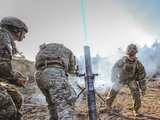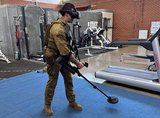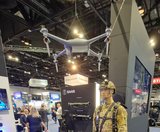Cubic tailors mortar simulator for the US Army
The company’s mortar trainer received improvements based on soldier’s feedback.
ICAVS(D) is a pathfinder project for the British Army's massive CTTP requirement. (Photo: Elbit UK)
Elbit Systems UK has been selected to deliver the Interim Combined Arms Virtual Simulation (Deployable) ICAVS(D) programme, a pathfinder project for the British Army’s Collective Training Transformation Programme (CTTP).
Replacing the in-service Unit-Based Virtual Trainer (UBVT) by 1 April 2022, ICAVS(D) is set to exceed the capabilities of its predecessor, primarily through the adoption of new hardware, including the latest graphic chips, and immersive virtual software.
The latter will include the UK MoD’s Defence Virtual Simulation (DVS) software. Originally won by Bohemia Interactive Simulations (BISim), the second iteration of the programme, DVS 2, is set to be awarded imminently.
ICAVS(D) will be used by both regular and reserve soldiers in the British Army and will also provide the ability to conduct experimentation and collective readiness training, from vehicle crew to Combined Arms Sub-Unit.
Elbit UK stated that ‘the platform will allow for rehearsal of complex operational environments in all weathers, terrains and environments, accurately reflecting the range of operational settings and equipment expected in contemporary operating environments'.
The company added that it will deliver ICAVS(D) as a full service contract ‘to support the British Army’s training at a time and place of their choosing. It can be deployed within barracks and on training areas, giving users significantly increased flexibility in when and where they are able to train’.

The company’s mortar trainer received improvements based on soldier’s feedback.

The company will operate in two new locations in the coming years to better support US services.

This type of tool provides more realistic training easing the incorporation of new scenarios that accurately represent the threats of the battlefield.

The Engineering Corps has been conducting individual instruction using FLAIM Systems’ Sweeper and should start collective deployments in 2025.

The next-generation platform is motion-compatible and can be used in OTW and NVG applications.

The system can be used to prepare soldiers for both drone offensive operations and CUAS missions.